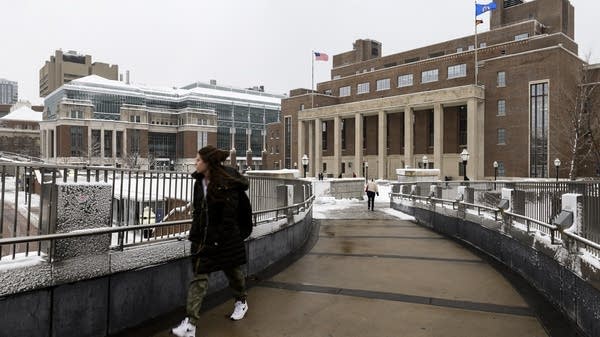One woman’s quest to offer free student loan advice to anyone who needs it
Last year, more than 12,000 people emailed Betsy Mayotte and The Institute of Student Loan Advisors. They all got answers. For free.

Last year, more than 12,000 people emailed Betsy Mayotte asking for advice about their student loans. She and a few coworkers and volunteers at her nonprofit, The Institute of Student Loan Advisors, wrote back to all of them. For free.
“We answer 95% of the questions we get within a business day,” Mayotte said. “And we do that because we understand that there's often a lot of anxiety around student loans, and we don't want to leave people hanging.”
Mayotte is a human encyclopedia when it comes to student loans. She’s been working in the field for more than two decades in compliance and advocacy, and has also participated in negotiated rulemaking sessions where the Department of Education makes changes to student loan regulations. She knows this stuff, inside and out.
Most borrowers do not. Instead, many find navigating the student loan system and their repayment options confusing and stressful. That’s been true for decades, but never more so than in the last five years. Since the pandemic began, the rules and options for borrowers have been in near-constant flux — payments were paused for several years, then resumed; the rules for loan forgiveness programs changed, then changed again; new income-based repayment plans were introduced, then blocked by courts. It’s been hard to keep track.
That’s where Mayotte and The Institute of Student Loan Advisors, or TISLA, come in.
“We're there to provide the right information at the time the borrower needs it,” she says. “The industry as a whole, they don't do a good job with that.”
So Mayotte tries to. She’s all over the student loan forums on Reddit, where people post questions and ask for help every single day. And she founded TISLA, which is funded through grants, donations, and partnerships, to offer people free, expert advice about student loans. Both on TISLA’s website, which has tons of information and FAQs, and via email.
“Student loans are my superpower,” Mayotte said. “It's my only superpower, which makes me really boring at parties.”
But helpful to those who are confused or stressed out about their loans and feel they have nowhere else to turn, which, judging by the volume of emails she gets, is a whole lot of people. Most find her by Google, Reddit or word of mouth.
On a recent weekday afternoon, she had 33 unanswered emails in her inbox, and that was after she’d already responded to a bunch that morning. Some only take a few minutes to answer, others might take an hour, or more.
“We get everything from people that email us and say, ‘can you help me with my student loans?’ And that's all they say. And I'm like, ‘well, maybe! We need a little bit more information!’” Mayotte said with a laugh. “Like, ‘what kind of loan do you have? And what's your actual question?’”
She gets those kinds of emails, and then she gets people who send her pages of details.
“They tell me their entire higher education history and loan history, and they attach ten screenshots. And I get everything in between.”
These days, the most common questions she gets are about the SAVE plan — an income-based repayment plan that President Joe Biden implemented that would have allowed borrowers to put as little as 5% of their monthly income toward their student loans. A federal court temporarily blocked the plan after a number of Republican-led states sued, but not before eight million borrowers had enrolled. They are now in limbo, and many have been emailing Mayotte asking what they should do about it.
Should they remain in forbearance, since it means they don’t have to make payments and interest isn’t accruing? Or should they apply to switch into a different repayment plan, so they can start making progress on their loans again?
“I have a stock answer,” Mayotte said, “but it can also depend on the person's situation.”
When she gets these questions, she replies with everything she knows, and everything that’s currently unknown, about what’s going on with the litigation over SAVE, and the pros and cons of riding out the current forbearance period or switching to a different plan, depending on the borrower’s personal situation and goals.
She also gets lots of questions from parents who have taken out Parent PLUS loans to pay for their kids to go to college.
“This person has six figures in Parent PLUS loan debt,” Mayotte said, skimming through an email. “They can't afford their payments, and they want to know what their options are. Now what's missing for me here to be able to answer this question fully is I need to know what the income is of that borrower.”
Because that will determine what kind of repayment plans they might be eligible for. So that’s what she’ll send back: a request for a little more information so she can give them personalized advice.
Next up in the inbox: “someone we responded to already this week, and they have some follow up questions, which is not uncommon,” she said.
In the original email, this person had told Mayotte they hadn’t made any payments on their loans, or paid much attention to them, since the pandemic began, and they’re now trying to figure out how to get back on track.
“They sent us some screenshots,” she said. “And it looks like at least some of their loans may have been in default. So we counseled them on how to get those loans out of default, which the options are usually either loan rehabilitation or consolidation.”
Mayotte has started getting a lot more emails in recent weeks from borrowers who are behind on their payments. That’s because the Trump administration just started sending people who have defaulted on their loans to collections again, and in some cases, garnishing their wages.
“There was a lot of panicked people that had just been reported as 90 days delinquent on their loans,” Mayotte said, “and they thought that they were gonna have their wages garnished.”
But there’s a difference between being delinquent, which means you’re maybe a few months behind on your loans, and being in default, which generally means you’ve missed at least nine months of payments.
“A defaulted loan is not eligible for, say, any of the income-driven plans and not eligible for deferment or forbearance, and delinquent loans are still eligible for those things,” she said.
Mayotte spends a lot of time lately explaining that difference, and people’s options for getting their loans back into good standing.
Also in the inbox on this particular afternoon: a question about which income-based repayment plan is best; another from a recent college graduate going into government about whether they should pursue Public Service Loan Forgiveness; and one from someone who has both federal and private student loans, is struggling to afford their monthly payments, and wondering what their options are.
Mayotte has answers for all of them.
This work is not a solution to the bigger issue, which is the ever-rising cost of higher education, she said. “Until we solve that, there is always going to be a student debt problem.”
And until then, this is her way of helping people, by trying to make navigating the system a little clearer.













